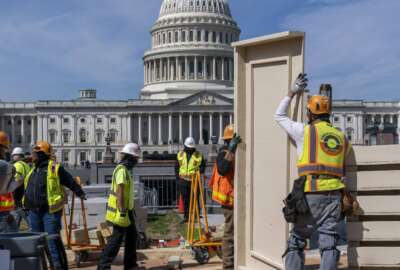Hubbard Radio Washington DC, LLC. All rights reserved. This website is not intended for users located within the European Economic Area.
The Labor Department shines a spotlight on the nation’s apprentice programs
Apprenticeships go back for eons in time. They became codified in the United States some 86 years ago with enactment of the National Apprenticeship Act. Now the...
Apprenticeships go back for eons in time. They became codified in the United States some 86 years ago with enactment of the National Apprenticeship Act. Now the Labor Department has brought new focus to this part of job training through what it calls the Apprentice Trailblazer Initiative. For what it is and what Labor hopes to accomplish, Federal Drive with Tom Temin spoke with Senior Policy Advisor Manny Lamarre.
Interview Transcript:
Tom Temin And let’s start with the background here. Where does the whole idea of apprentices and apprenticeship live in the Labor Department and how extensive is it in the United States?
Manny Lamarre The National Apprenticeship Act really came about in 1937, but the concept of apprenticeship has always been around, has always existed. But it was codified in the 1937 National Apprenticeship Act. Now, when we think about apprenticeship, one thing that’s important to know and differentiate is what’s the difference between a registered apprenticeship and other forms of work based learning, such as internships and other on the job training models? When we talk about registered apprenticeships here, we’re talking about an industry driven, high quality career pathway that is validated by the U.S. Department of Labor, and it happens either through the U.S. Department of Labor or state apprenticeship agencies. But really, the core difference of a registered apprenticeship and why we call it the gold standard is that it includes paid work experience. It always includes paid work experience, classroom instruction and a portable, nationally recognized credential. And so when you put those together, that really sets it apart as the gold standard. And in addition to credential, there’s also components of diversity, quality and safety that is embedded within our apprenticeship regulations at the Department of Labor. And so there’s additional components to ensure that the apprentices are safe, they’re protected, and that goes, again all the way back to the National Apprenticeship Act. But within the Department of Labor, ETA, we have the Office of Apprenticeship in that office really oversees apprenticeship really around policy across the U.S..
Tom Temin Sure. And when you say nationally recognized credentials, aren’t a lot of trades that have apprenticeships, state licensing? I mean, how many are there that are actually requiring a national credential? I mean, give us some examples.
Manny Lamarre Right. So when I talk about a nationally recognized credential, I’m talking about the certificate that you receive, the certificate of completion that you receive by completing the registered apprenticeships. States may have additional specific licensing required for particular occupations. What we talk about a nationally recognized credential. We’re talking about the national certificate of completion that is recognized across the country for completing the registered apprenticeship, where they know that you completed a bona fide approved registered apprenticeship.
Tom Temin Because these tend to center around the crafts and trades. Am I correct in saying steam fitting, welding, electrical type of work that are highly skilled trades, but those tend to be localized types of licensing to actually execute as a profession?
Manny Lamarre So that is somewhat correct. I think what’s important to know is that historically registered apprenticeship were and have been in the construction trades, whether we’re talking about carpenters, plumbers, electricians, operating engineers and so forth. However, I think what’s important to know is that across the country that there’s registered apprenticeships across a variety of sectors and that includes health care, cybersecurity, information technology. We even have them in education. And I can provide some quick statistics for you, for example, which is in the past year we started off with K-12 teacher apprenticeships in two states about a year ago. Now we’re at 21 going on 23 states with over four dozen programs in K-12 teacher educations. We’ve have apprenticeships in trucking and we have apprenticeships in cybersecurity, as I mentioned. So registered apprenticeships really cuts across sectors in the country. But you’re right in that the foundation has been in the building trades, but it really is existing across sectors that we have that data entrepreneurship back up that really shows the scale and scope of apprenticeships now in new sectors.
Tom Temin We’re speaking with Manny Lamarre. He’s a senior policy adviser at the Labor Department’s Employment and Training Administration. And let’s talk about the Apprentice Trailblazer initiative that is new here on the 86th anniversary. You could have done it on the 85th or the 90th, but 86 of the 1937 law. What is this initiative all about? What does it seek to do?
Manny Lamarre Really, what we think about scaling restorative pensions across the country. We know a couple of things that are really important. Number one, it’s very important to include the voice of young people. Number two is important to include the voice of individuals that actually went through an apprenticeship program. So the Apprentice Trailblazer Initiative is really designed to create a national network of diverse apprentices and apprenticeship graduates of all ages and backgrounds to really serve as champions of registered apprenticeships. And we want them to share their perspectives, their success stories and experiences as apprentices to really help elevate and support and scaling their registered apprenticeship system across the country. But that’s really what it’s at the core it is. It’s sharing our perspectives and the benefits, providing examples of innovative ideas and strategies to strengthen and modernize and diversify the program. They can strategically around increasing support for underrepresented populations in underserved communities, as well as promoting and expanding awareness of registered apprenticeships for career seekers really looking to get access to good quality jobs and stability for their families and within their communities. But that’s really at the core of what The Apprentice trailblazer is.
Tom Temin So will people share videos of themselves talking about what’s going on in their lives and how they became apprentices and what they accomplished? Will it be published stories? I mean, what form will all of this kind of promotion take?
Manny Lamarre A few things and more to come. So it will include highlighting success stories, whether it’s virtually highlighting, engaging with them in networks, in-person engagement, both virtual and in-person engagement. So to some of the examples that you mentioned, it would include things as as videos written, but mainly it’s really around elevating their voices across both virtual and in-person engagement as well. But I do think one other thing that’s important to highlight is like, why if I’m an apprentice or an apprentice graduate, I might be thinking like, what’s in it for me? Like, why should I become an apprentice trailblazer? And I think for that component, we really see it as a great opportunity for professional development. So where we think about continuing skill building, teamwork, leadership we see it as an opportunity to really help shape and modernize our apprenticeships and reflect the various experiences of individuals, but also so, again, to strengthen their network serve as role models. We know that there are a lot of apprentices that want to support and serve as role models. So these both really elevating their network and being able to receive professional development in that network, as well as serving as mentors in supporting and sharing their experience as well through the national recognition.
Tom Temin And do you think that there might be opportunity for other industries that don’t have formal apprentice programs to see this and say maybe this could benefit my industry also?
Manny Lamarre That’s a great point. Absolutely. It’s partly that, too, that you’re absolutely spot on with that. It’s not just the existing industries and sponsors and employers that have registered apprenticeships that can see this and and expand. But it’s also those that don’t have registered apprenticeship programs to also elevate and exceed the opportunities. What’s in it for them? What’s in it for their employees? We know that registered apprenticeship the return on investment. There’s a over 90% employees stay in retain on the job. We know that we have studies that shows that they’re more productive. They’re more likely to stay in retain. So those employers that don’t have apprenticeships can see this as an opportunity as well to really expand on it.
Tom Temin And for those companies or industries that have federally recognized or Labor Department recognized and certified apprentice programs, what is the advantage of having that to them?
Manny Lamarre It’s really about continuing to expand, as I mentioned before, around the return on investment. For every $1 investment that employers make, there’s 144 in return for every $1 that the federal investments, there’s $28 in return. So I say that to say to your question about what’s in it for them, it’s really around continuing to elevate the best practices and the good examples that their companies are leveraging as part of the registered apprenticeship. But I do think one other thing that’s important to highlight as we think about this is this is really part of our broader youth employment work strategy. And so within the Department of Labor and it’s almost 18 years now since we’ve launched a national youth employment strategy. And really that really consists of a no wrong doors approach for young people, paid work experience and industry commitment. So this goes back to your question around the employers too, the industry commitment to young people. So this has been really that apprentice trailblazer has really sent around a broader so it’s not just an isolated initiative. It’s really think about a broader youth employment strategy that we see within the Department of Labor and ETA that really leads up to National Apprenticeship Week, November 13th to the 19th. So really the National Apprenticeship Week is a week of really highlighting opportunities within apprenticeships, highlighting success stories. Various events and engagement across that National Apprenticeship Week. So all of this is really part of a broader strategy that we see within the Department of Labor.
Copyright © 2024 Federal News Network. All rights reserved. This website is not intended for users located within the European Economic Area.
Tom Temin
Tom Temin is host of the Federal Drive and has been providing insight on federal technology and management issues for more than 30 years.
Follow @tteminWFED
Related Stories
Apprenticeships help St. Louis-area veterans find place in federal technology sector
Related Topics





